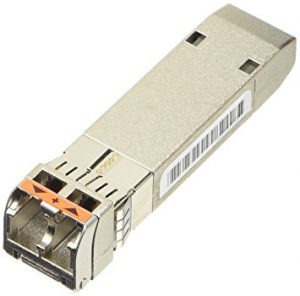$995 for a 10G SR SFP+ module. $500 for the most basic multimode Gigabit SFP module. These are the genuine list prices from one of the biggest network equipment vendors going. They are big numbers, especially when you consider just how many of these units a network needs. Just a basic network with 10 or so switches can use 20 or more optical modules.
OK, granted it is very unusual an end user would pay anything like list price. Generally a partner of the vendor will receive 40-50% off list and normally they don’t add that full amount back on as a margin to their customer. I would think a reasonable average discount is around 20-30% off list price for an end user. That still puts a bog standard multimode Gigabit module in the region of $375, around £300 in proper money.

It is no wonder 3rd party modules are an attractive option to an end user. Even the vendor partner – the guys promoting, selling and installing the hardware – often find a 3rd party product more attractive as it can make their bid price on a project far more competitive. So really, does buying vendor branded modules get you anything more and where is the price justification?
So lets clear up a couple of details first, for when we talk about 3rd party products – compatibility and warranty. Making sure 3rd party modules work in vendor A or B’s switch should be a breeze thanks to the MSA, right? Well, I discussed that issue in more depth in a previous post. But lets say for arguments sake right now, you are purchasing a reputable brand of module that is coded and tested to ensure compatibility with your chosen vendor – lets assume you’re buying Advance products, right?!
My second point then is concerning warranty. There seems to be some confusion in the market as to whether vendor warranties are voided by the use of 3rd party optics. The truth is… no. It’s quite simple really, if you have a 3rd party module installed and the module fails then sure, you can’t expect the switch vendor to provide you with any support to resolve that. But if the switch fails for some other reason – PSU failure, a software issue etc then the vendor will still warrant and support their product. Cisco even publicly advertise this exact information. I think the most pertinent thing to acknowledge here is the importance of purchasing 3rd party modules that offer a decent warranty. Maybe a lifetime warranty, with next day advance replacement should be the target any purchaser aspires to.
With that all understood, back to the original question – how is the vendor price justified? We have decided compatibility of the product is not a valid argument as there are options out there that offer the same function for a fraction of the cost. Maybe it’s down to the product quality, the build and lifetime expectancy then? Alas, this is another point that may be used as a basis for some justification on the vendor’s behalf but it’s plainly false.

I am not aware of any switch/router/server etc manufacturer that also manufactures their own optical modules. They all use one or more OEMs – original equipment manufacturer (think Finisar, JDSU, Oclaro etc). Basically a company that owns its own factories, independently from any other vendor and makes a product that complies with standards and specifications accepted by the whole industry, not just one particular vendor.
So it is not as though vendor A or B can say their product has some technical advantage that the others lack. These products roll off the production line, each the same as every other one before it, and then get put into packaging for vendor A or B. The only differences being, in some instances a vendor code programmed into EEPROM, and the sticker applied to the module. Other than that these modules are all the same, and the OEM will often sell exactly the same product, from exactly the same manufacturing batch, under their own brand as well for a tenth of the price.
Are you struggling to see where the price justification is? I am. I could attribute a few cents to the cost of branding the labels and packaging. Maybe even a couple more cents for the process of programming the vendor code to EEPROM. I still can’t account for the £270 difference between a certain vendor’s multimode Gigabit module and an Advance multimode Gigabit module though. There is no warranty benefit, no performance benefit, no obvious benefit at all to using a vendor branded module. I’ll let you make the final decision.
